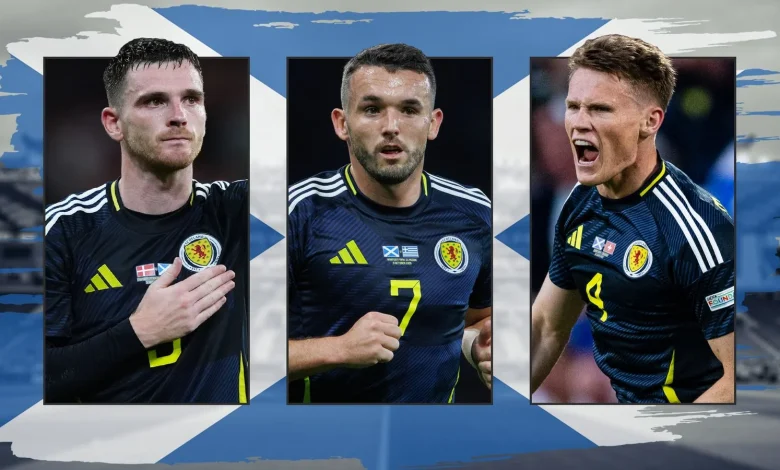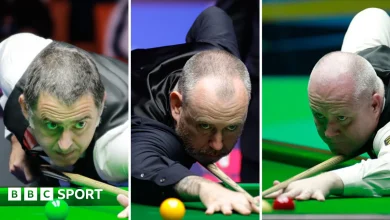World Cup qualifying: How Scotland can automatically reach next summer’s tournament after 28-year absence

Scotland’s World Cup dream could be realised at Hampden Park next week.
1998 was the last time the Tartan Army partied at football’s biggest tournament – Steve Clarke has them believing the long absence is about to end.
There are just two games left in Group C with automatic qualification remaining a possibility.
Clarke’s side have beaten Belarus twice, won against Greece at Hampden and held Denmark to a goalless draw away from home.
Scotland and Denmark are level on 10 points and out of the reach of the Greeks as they sit seven points behind with just two games left.
But, goal difference means it’s the Danes who sit top of the table.
A play-off place is already secured, but automatic qualification is the ultimate prize for Scotland.
To finish top of Group C, they need to overcome the current goal difference deficit and stay ahead of Denmark on points or, if tied, surpass them on goal difference.
Scotland beat Greece at Hampden Park last month
Victory in Athens on Saturday would put them in the perfect place ahead of their showdown with the Danes at Hampden Park three days later.
It is unlikely that winless Belarus will spring a shock in Copenhagen, meaning the Scots will need at least a draw to keep their table-topping hopes alive.
If they then win at the National Stadium, a place at next summer’s World Cup is guaranteed.
To put it simply, Scotland must pick up more points than Denmark in the remaining two games or they face the pressure of the play-offs.
How do play-offs work?
Scotland’s last World Cup appearance was in 1998
The 12 group runners-up will participate in the play-offs, along with the four best-ranked group winners of the 2024/25 UEFA Nations League that did not finish their European Qualifiers group stage in first or second place.
The 16 teams that enter the play-offs will be drawn into four play-off paths, with four teams in each. Play-off matches will be played in single-leg semi-finals, followed by single-leg finals within the same international window in from March 26 to 31 next year.
How many European teams will qualify?
In total, 16 UEFA nations will qualify for the 2026 World Cup. The 12 group winners qualify directly for the World Cup; the four remaining berths are determined by play-offs involving the 12 group runners-up.
Scotland squad in full:
Goalkeepers: Scott Bain (Falkirk), Craig Gordon (Hearts), Liam Kelly (Rangers).
Defenders: Josh Doig (Sassuolo), Grant Hanley (Hibernian), Jack Hendry (Al Etiffaq), Aaron Hickey (Brentford), Scott McKenna (Dinamo Zagreb), Anthony Ralston (Celtic), Andy Robertson (Liverpool), John Souttar (Rangers), Kieran Tierney (Celtic).
Midfielders: Ryan Christie (Bournemouth), Lewis Ferguson (Bologna), Ben Gannon Doak (Bournemouth), Billy Gilmour (Napoli), John McGinn (Aston Villa), Kenny McLean (Norwich), Scott McTominay (Napoli), Connor Barron (Rangers), Andy Irving (West Ham).
Forwards: Che Adams (Torino), Lyndon Dykes (Birmingham), George Hirst (Ipswich), Lawrence Shankland (Hearts).
From ‘head-scratcher’ to the brink of history
Scotland’s Che Adams opened the scoring against Belarus
Scotland picked up four points from their opening two qualifiers, drawing away to top-seeds Denmark, before beating Belarus 2-0 to end September joint-top of the table.
Next up was a Hampden Park double header in which all six points were claimed.
Clarke’s side did it the hard way, as they came from behind to beat Greece 3-1, before a 2-1 win over Belarus helped secure a play-off spot.
That victory over Belarus saw Clarke take charge of a record-breaking 72nd game as national team boss, but afterwards he described the performance as a “head-scratcher”, before adding it was “possibly as disappointed as I’ve been over the whole 72 games”.
Scotland head coach Steve Clarke admits their performance in their unconvincing World Cup qualifying win vs Belarus was a ‘head scratcher’.
However, Clarke did promise “a different animal” for these final two games against the already eliminated Greece and group leaders Denmark.
A play-off spot is secured, but two more wins will seal a return to the World Cup for the first time since 1998. Scotland and Clarke are on the brink of making history.
World Cup 2026 European qualifiers schedule
- Final group-stage match dates: November 13-18, 2025
- Play-off match dates: March 26-31 2026
- Final tournament dates: June 11 to July 19 2026
When and where is the 2026 World Cup?
Enable Cookies
Allow Cookies Once
The 2026 FIFA men’s World Cup takes place from June 11 to July 19, 2026.
The tournament will take place across 16 cities in three North American countries: the United States, Canada and Mexico. It is the first time a World Cup has been hosted by three nations.
The last time North America hosted the tournament was in 1994, when Brazil triumphed after beating Italy on penalties.
An expanded World Cup will feature 48 teams – 16 more than in Qatar 2022 – and take place across three host nations for the first time.
World Cup 2026 schedule
Group stage: June 11-27
Round of 32: June 28 to July 3
Round of 16: July 4-7
Quarter-finals: July 9-11
Semi-finals: July 14-15
Third-place play-off (‘Bronze final’): July 18
Final: July 19





